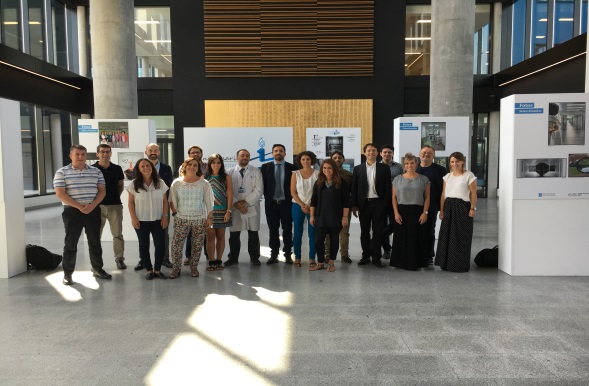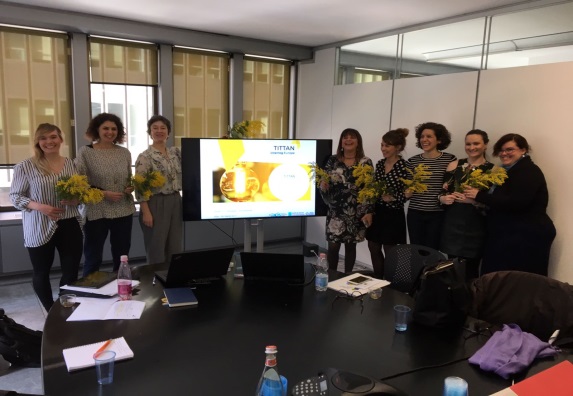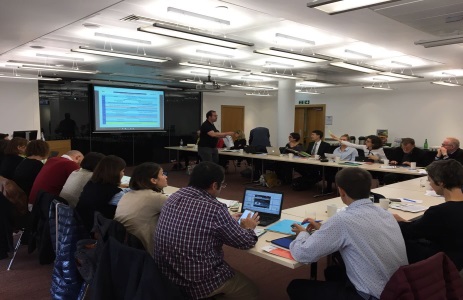The TITTAN Project has celebrated its second year looking for the improvement of the quality of health systems through innovative products and services in the field of active and healthy ageing with the exchange and implementation of good practices among different European regions.
The four-and-a-half-year project TITTAN (Network for Technology, Innovation and Translation in Ageing) has been underway for last two years, funded with almost 1.7 million euros from Interreg Europe. There are seven European regions involved in it: Basque Foundation for Health Innovation and Research (BIOEF); Galician Health Knowledge Agency (ACIS) -lead partner-; Fondazione Regionale per la Ricerca Biomedica (FRRB, Lombardy); Healthy Saxony (HS); Digital Health & Care Institute (DHI, Scotland); Lower Silesian Voivodeship Marshal Office (LSVMO); and the City of Almere, in the Netherlands.
TITTAN partners have been working together in a series of international workshops and in situ visits in which different regionally tested good practices were compared to contribute for the improvement of the regional policy instruments linked to the EU structural funds, within the three areas of action established in the project:
TA1. OUTSIDE-IN TECHNOLOGICAL INNOVATION:  to promote the acquisition of innovative products and solutions for public healthcare systems, mainly through the implementation of innovative procurement practices, such as Precommercial Procurement (PCP) and Public Procurement of Innovative Solutions (PPI), but also through the analysis of other approaches.
to promote the acquisition of innovative products and solutions for public healthcare systems, mainly through the implementation of innovative procurement practices, such as Precommercial Procurement (PCP) and Public Procurement of Innovative Solutions (PPI), but also through the analysis of other approaches.
- Santiago de Compostela and Vigo, 5th – 7th Sept. 2016:
- 1st Interregional Workshop
- Study Visit to Álvaro Cunqueiro University Hospital
- In addition to the workshop, the following In-Situ Visits have been carried out as part of AT1
- In Situ Visit to Compostela (18th-19th January 2017; Public Procurement)
- Visit to Scotland (15th-17th February, 2017; Living It Up , TEC Programme)
- Hosted in the Basque Country (22nd-23rd February, 2017; INNOSASUN)
TA2. INSIDE-OUT TECHNOLOGICAL INNOVATION: to reduce the gap between research and market in the health sector, by promoting the establishment of innovation ecosystems, based on the quadruple helix approach (public bodies research industry communities).  Ecosystems should promote the transfer of translational research results to companies and boost the developing of new products and services.
Ecosystems should promote the transfer of translational research results to companies and boost the developing of new products and services.
- Milan, 6th-8th March 2017:
- 2nd Interregional Workshop
- Study visit to Gnocchi Foundation
- Almere, 29th-31st May 2017:
- 3rd Interregional Workshop
- Study visit to A-Lab Amsterdam and HealthFactory (“Living Lab”), the Big Data Value Center and Senior Live (social innovación) of Almere
- As part of AT2, the following In-Situ Visits were held:
- Hosted in the Basque Country (14th December 2017; M4FUTURE)
- Visit to Saxony (07th March 2018; C3 Saxony)
TA3. ACTIVE CITIZENS FOR HEALTHY AGEING: to raise citizen´s awareness and knowledge about using new technologies for improving quality of life, through the adoption of ehealth practices and the patients involvement in co-design experiences with health professionals and caregivers.
- Edinburgh, 2nd-4th October 2017:

- 4th TITTAN Interregional Workshop
- Study visits to ALISS, SHIL and DHI in Glasgow
- Dresden, 5th-7th February 2018:
- 5th Interregional Workshop
- Study visit to the Fraunhofer Institute for Cell Therapy and Immunology in Leipzig and the Proton Treatment Centre of the Dresden University Hospital
- These workshops have been complemented with the following In Situ Visits in the current AT3:
- Basque Country (15th December 2017; Euskadi Lagunkoia)
- Visit of the Basque Country to Scotland (05th October 2018; DHI)
The 11th April the Interregional Workshop on Personalised Health was held in Milan bringing together I-E Projects which deal with Health and Life Sciences challenges, International Projects (TO-REACH, IC-PerMed & ERA-PerMed), pan-European initiatives like ESTHER (Emerging and Smart Technologies for Healthcare) in order to understand which are the main priorities for Personalised Medicine that can be tackled at regional level.
At the end of April, the Basque Country will visit Amsterdam to learn more about the initiatives developed in the Netherlands, such as “Senior Live Foundation”, “Amsterdam Age Friendly”, and “Amsterdam Healthy Weight”. BIOEF, together with the Matia Institute, EHU-UPV, and responsibles for the Bidasoatik Mundura programme will be attending from the Basque Country.
The Workshop of the Lower Silesian Voivodeship Healthy Ageing inWroclaw, 7th – 8th May 2018, is planned to complete the first phase of the project.The meeting of Lower Silesia stakeholders with project partners will enable to present good practices that have not been presented so far in order to check the feasibility to implement some of them in the Polish region. Lower Silesia creates currently one of the five planned Centers of Geriatric Competence. This is created at the A. Falkiewicz Specialist Hospital. Therefore, the Polish partner will organize this conference together.
Relevant regional and local stakeholders also are part of the interregional learning process, some of them involved in the policy-making process and policy implementation. In collaboration with BIOEF, OSAKIDETZA and the Health Ministry, the following organizations are involved in the TITTAN project at a regional/local level: Kronikgune, TECNALIA, IK4, the University of Deusto (UD), the University of the Basque Country (EHU-UPV), the Matia Institute and Mondragon Corporation (MCC).





